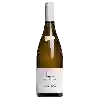
Winery André GoichotBourgogne Aligoté
In the mouth this white wine is a powerful.
This wine generally goes well with rich fish (salmon, tuna etc), shellfish or mild and soft cheese.
Taste structure of the Bourgogne Aligoté from the Winery André Goichot
Light | Bold | |
Dry | Sweet | |
Soft | Acidic |
In the mouth the Bourgogne Aligoté of Winery André Goichot in the region of Burgundy is a powerful.
Food and wine pairings with Bourgogne Aligoté
Pairings that work perfectly with Bourgogne Aligoté
Original food and wine pairings with Bourgogne Aligoté
The Bourgogne Aligoté of Winery André Goichot matches generally quite well with dishes of pasta, rich fish (salmon, tuna etc) or shellfish such as recipes of pork filet mignon with foie gras and rosemary, sardines with escabeche or lamb with okra sauce.
Details and technical informations about Winery André Goichot's Bourgogne Aligoté.
Discover the grape variety: Aligoté
Aligoté is an ancient Burgundian grape variety (it has different names depending on the region in which it is grown: griset blanc in Beaune, giboudot blanc in the Chalonnais or troyen blanc in the Aube), mainly used in the production of Bourgogne-Aligoté, Bouzeron and Crémant-de-Bourgogne.aligoté is a medium-fine white grape variety, quite productive, which gives clear, acidic, fresh and light white wines. An anecdote often says that it was a member of the clergy named Kir who gave it its letters of nobility by adding it to blackcurrant cream to prepare an aperitif.produced on more than 1,600 hectares in Burgundy, aligoté has also been exported. It is also cultivated in Eastern Europe (Ukraine, Romania), California, Canada and Chile, representing more than 20,000 hectares in the world.
Informations about the Winery André Goichot
The Winery André Goichot is one of of the world's great estates. It offers 232 wines for sale in the of Bourgogne Aligoté to come and discover on site or to buy online.
The wine region of Bourgogne Aligoté
This regional appellation is the only one to mention a Grape variety name. There are as many aligotés as there are areas in Burgundy where they are made: in Pernand, they are supple and Fruity; in the Hautes-Côtes, they are fresh and lively; finally, those of Bouzeron have acquired a distinct appellation. This Dry white wine is a Decanter wine to be drunk Young. It is ideal for the kir, an aperitif composed of blackcurrant cream and fresh white wine.
The wine region of Burgundy
Bourgogne is the catch-all regional appellation title of the Burgundy wine region in eastern France ("Bourgogne" is the French name for Burgundy). Burgundy has a Complex and comprehensive appellation system; counting Premier Cru and Grand Cru titles, the region has over 700 appellation titles for its wines. Thus, Burgundy wines often come from one Vineyard (or several separate vineyards) without an appellation title specific to the region, Village or even vineyard. A standard Burgundy wine may be made from grapes grown in one or more of Burgundy's 300 communes.
The word of the wine: Pigeage
Operation consisting of a vertical treading to push the cap of marc into the wine, which promotes extraction. Pigeage can be carried out mechanically with jacks that plunge into the vat. Traditionally, it is the men who go down into the vats and push the cap by trampling it.














